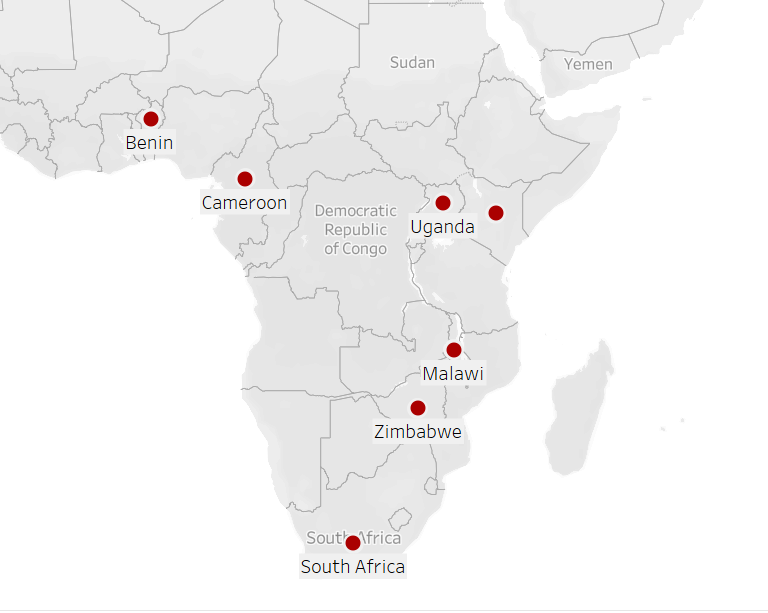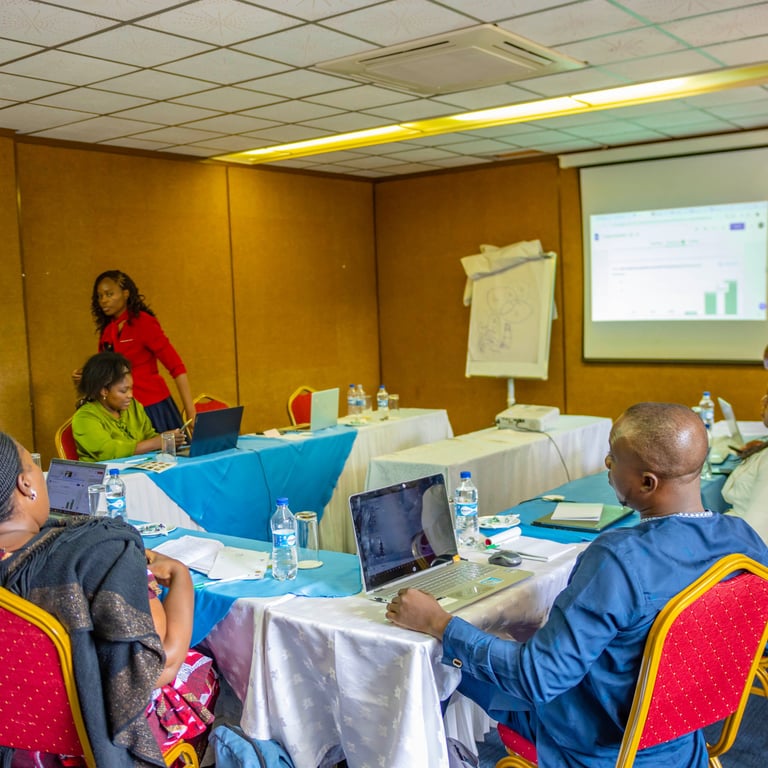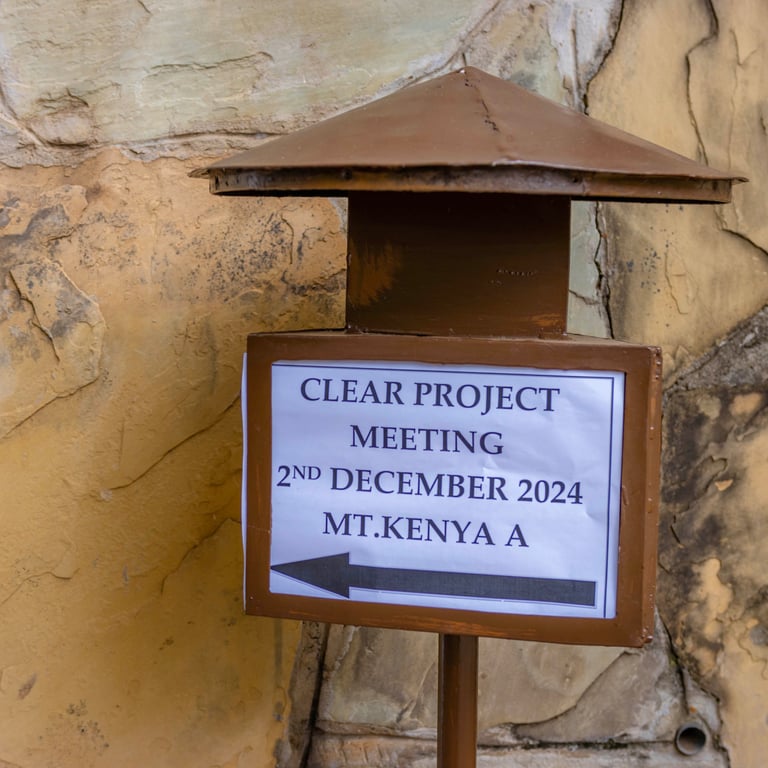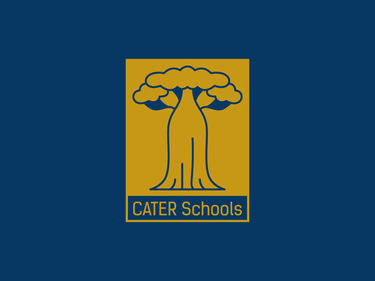From CATER School 2023 to Collaboration
The CLEAR team, formed at the 2023 CATER Summer School, united African early career researchers and practitioners to enhance climate action through collaborative research and capacity building. Their journey, culminating in a Nairobi workshop, highlights the challenges and rewards of transdisciplinary teamwork in addressing climate-related challenges.
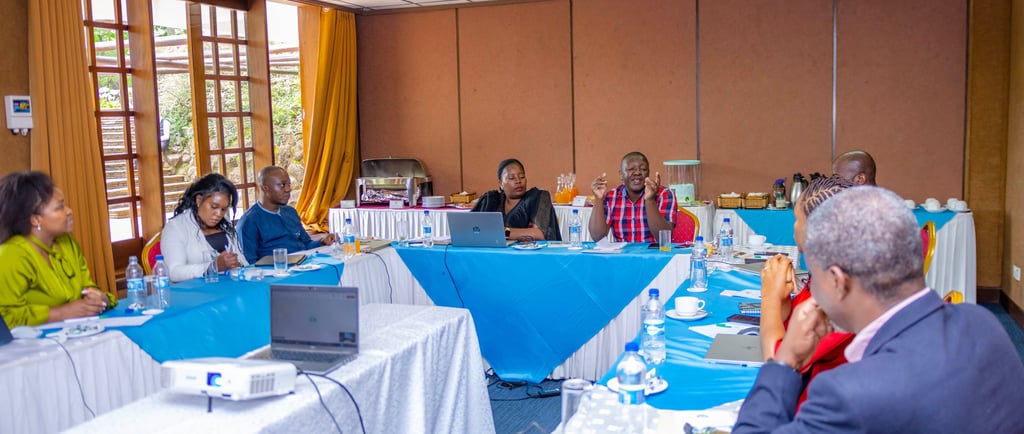

Here is our story of collaboration in a transdisciplinary team of African Early Career researchers and practitioners:
The seeds of our CATER-CLEAR collaboration workshop in Nairobi, Kenya, were sown in Naivasha at the end of the inaugural 10-day CATER Summer School held in November 2023. The CATER Schools on Transdisciplinary Climate Risk and Action brought together a diverse group of early career researchers and practitioners involved in climate services from various parts of the world. One of the gains of being at the CATER School was learning to work in transdisciplinary teams while upholding the values of co-production and teamwork, as well as understanding and acknowledging our positionality. The group activities of developing serious games is the aspect of the school that most participants, identified as the most challenging yet the most rewarding component. Thus, we sought to put our skills into practice. What better place to start than within our cohort of the inaugural CATER School?
As early career researchers and practitioners of African origin based in Africa and abroad, we navigated the dynamics of collaboration across disciplines to build a team to engage in other collaborations in future. A highlight of this journey was reuniting in person a year later, with the generous financial support of the CATER Schools. This workshop was the result of months of planning, including our trademark ‘Friday meetings’ every other week since July 2024. As one of us put it,
‘It makes a big difference to be in the same space, cross-fertilizing ideas, and use collective capacities to aim for a common goal.’
The Road to Nairobi Workshop and Navigating the Challenges
We named the group CLEAR (Climate action Learning for Early African Researchers) to separate our project from the Cater schools. The CLEAR aim since inception has been to build on our gains from the 2023 CATER School, especially the group work, to enhance climate action and research in Africa through collaborative research initiatives and leadership. Through collaboration and team building, including enhancing our research skills. Our first collaborative research was to reflect on the CATER Summer School, although we later agreed to expand and examine the influence of climate-related training and short courses in empowering early-career African researchers and practitioners in the field.
The excitement and enthusiasm were evident from the members during the initial meetings and brainstorming sessions. We set up a WhatsApp group and scheduled Friday afternoon online meetings every fortnight on Microsoft Teams to keep the team together as well as to check on the progress made from the previous meeting and tasks.
We experienced some of the challenges of coproduction and working in multidisciplinary teams that were discussed in one of the plenary sessions in Naivasha. On evaluation, we realised that these challenges centred around commitment and undefined roles. Our common interest in sustaining a functional transdisciplinary team kept us motivated, along with the Nairobi workshop and the manuscript. With the benefit of hindsight, we find the process of navigating these challenges rewarding.
As the members took their positions, one would have assumed that we had similar interests or shared the same values or that each had a unique role. Alas, we soon learned that the group was more heterogeneous than initially assumed, did not necessarily share the same values, and that disciplinary and cultural backgrounds had a significant influence on the interactions.
Conflicts were most evident in method development, for instance, a journalist and a statistician each viewed data privacy differently though they all emphasized ethical considerations. While a journalist may focus on revealing important stories, our statistician prioritized following data protection protocols and implementing proper data aggregation methods. Similarly, a social scientist and a natural scientist would all value data integrity but interpret it differently, with the latter emphasizing statistical reliability and reproducibility, and the former focusing on qualitative validity and contextual authenticity. These differences extended to standards of evidence and approaches to measuring and validating results. It was messy during this stage, and we had to reevaluate the group.
After facing multiple instances of confusion about the meeting times and schedules, we resolved to fix the meeting times and have scheduled fortnightly meetings on Microsoft Teams and sent reminders for the meetings on the WhatsApp group. While this provided a solution to one challenge, the different time zones and other commitments of the members meant that some meetings proceeded with some members absent. We sent meeting updates to keep everyone abreast of the discussions. This led to better adaptation, with meeting times often adjusted to accommodate different schedules, while regular WhatsApp updates or reminders, and using the same link for all the meetings provided some solutions to our challenges.
We identified the need for clearer communication about everyone’s roles and responsibilities, as some were often unclear about what was expected of them. In response, members chose specific roles based on their expertise while rotating leadership roles on different activities encouraged open sharing of thoughts. In some instances, we used quick polls to reach a consensus.
After back and forth in developing an online survey questionnaire to gather broader insights from participants in climate-related schools and training, we eventually sent it out a month after our initial deadline. The delay meant that our time for preliminary data analysis before the workshop was reduced. Although we were able to spread the questionnaire, we were unable to extend it further enough to allow more responses.
Towards the weeks leading to the workshop in Nairobi, meeting attendance was sometimes low and in some cases without explanation. For instance, one crucial briefing about the Nairobi workshop had only three members, leading to confusion among those who didn't follow up for updates. The consequences were felt strongly in Nairobi.
We strived for inclusive decision-making by seeking input from everyone on program planning and activities, although this wasn't always successful despite the supportive environment. Despite efforts for equal participation, engagement levels varied among members. The emphasis on inclusivity sometimes slowed our decision-making processes and affected timelines. Extended discussions didn't always lead to clear resolutions, and we occasionally lost focus on our objectives. We still haven't reached a consensus on some aspects, including an agreed-upon wording of the manuscript title. Nonetheless, the team showed considerable flexibility when members faced challenges or emergencies, but we sought to balance this flexibility with progress by setting clear deadlines while allowing for reasonable adjustments.
The Nairobi workshop, a catalyst for transdisciplinary collaboration
During the workshop, constructive discussion approaches became more evident. The team balanced diverse opinions while maintaining momentum. As one of us said after the workshop,
‘I was amazed by the quality of output, including the linkages between what participants felt were the hurdles for effective training of AECRs',
while another reported,
‘I particularly enjoyed the collaborative working approach. There were learning opportunities for me...’
During the entire workshop, we demonstrated particular adaptability in supporting virtual participation by one member who could not travel at the last minute due to an emergency, with members taking turns to ensure he stayed connected and updated. Despite the challenges we encountered, we demonstrated a sustained commitment to transdisciplinary collaboration and knowledge sharing. We learned that effective collaboration requires a significant time investment, mutual respect, and sustained effort beyond face-to-face interactions to achieve set objectives.
Our evaluations after the workshop revealed that individuals in the group upheld and expected certain values from others. Often, each person expected others to share their values. Openly exploring and reflecting upon these values earlier would have helped us understand how they influence our collaboration and research. Had these been stated clearly and discussed during our online collaboration meetings, our Nairobi workshop could have been different.
Looking to the future
While common interests, such as writing a manuscript, can drive the group forward, our guiding principles emerge more from the research collaboration process in its entirety. We found it important to actively listen to each other as our analysis of our meeting contents revealed several key principles that different members emphasized at various points. Future collaborations to be successful, require members to be open to different perspectives, avoid biases that could limit research scope, allow for constructive discussion through encouraging open dialogue and presenting objections thoughtfully rather than flat dismissals, and ensure inclusivity for all voices to be heard.
As we navigate beyond the Nairobi workshop, we are optimistic that the engagements that we have sustained since the 2023 CATER Summer School and the commitment to enhancing transdisciplinary climate action and research in Africa, will continue to foster future collaborations. Look out for our output as we continue to develop our manuscript that will contribute to how future climate schools are designed and/or implemented.
About the authors:
Hilda Kabuli is a statistician in the Department of Agricultural Research Services, Lilongwe, Malawi. Sinikiwe Dube is a postdoctoral research associate in the Faculty of Earth & Environmental Sciences, Marondera University of Agricultural Sciences and Technology, Zimbabwe. Ephias Mugari is a Postdoctoral Research Fellow in the South Africa/Flanders Climate Adaptation Research and Training Partnership (SAF-ADAPT) Project in the Department of Geography and Environmental Sciences at the University of Venda, South Africa. Quentin Togbévi is a specialist in Soil-Water-Environment and Modeling in the Department of Water for Agriculture and Society, University of Abomey-Calavi, Benin. Eric Ngang is Founder and Coordinator of the Action Group on Governance and Environmental Management (AGGEM), Birmingham, UK.
Gallery
Pictures from the CLEAR workshop
